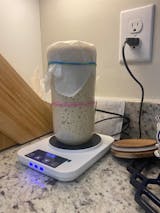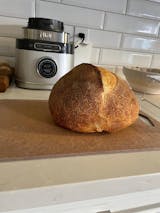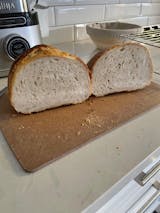What is the best water to use for my Sourdough Starter?
What water should we use for our sourdough starters?
The water that you use for your sourdough starter should be chlorine free (and chloramine free), a neutral PH, in the correct temperature range, and while having some minerals, not be overly mineralized.
Practically speaking filtered tap water, bottled spring water, and dechlorinated tap water should all work very well for feeding your sourdough starter. If you use well water things can get a bit more complicated, but it will likely be fine.
Let's take a closer look at how we can make sure the water we feed our sourdough starter is going to support it becoming super active. But first, if you are brand new to sourdough baking perhaps first take a look at our article What is a Sourdough Starter (and why you should want one!)
1. Your water you use to feed your sourdough starter should NOT have chlorine or chloramine.
Chlorine is a reactive chemical often added to municipal water supplies as a disinfectant to kill pathogenic bacteria and other undesirable microbes. Chloramine is a more stable form of chlorine (its combined with ammonia) that is less reactive but longer lasting.
Both chlorine and chloramine can impair the good yeasts and lactic acid bacteria that provide the magic of your sourdough starter! The concentrations in municipal water supplies are usually more than enough to slow or even kill your starter. Especially when we are activating our sourdough starters, we want to avoid these chemicals.
Nearly all municipalities in North America use chlorine or chloramine in their water supply. In Europe it is less common but still common enough that we would advise checking before starting to feed your starter. The good news is a simple web search of your town or city and chlorine will almost always reveal the drinking water safety page for that place, and you will have your answer!
What to do if your tap water has chlorine of chloramine?
First, figure out which one you have! The key for us is that Chlorine will evaporate! Chlorine evaporates from water left uncovered for 24 hours, and faster if you stir or aerate it. You can also boil water for 10-15 min to remove chlorine. You can also easily remove chlorine with any of the popular activated charcoal water filters such a a Brita or PUR filter.
Chloramine will NOT evaporate and is NOT removed by boiling. Instead, it must be removed using an activate charcoal water filter. The good news of course is that these filters are easy to use, effective and affordable! We use a PUR filter and have had great results. It can be a bit more expensive than some of the familiar names but there are some indications it performs better, which is important to us!
Mini-Bonus Note: Cleaning residue such as dishwasher detergent that didn't quite rinse off on your jar or in your water will have the same effect as chlorine! Anything that is strongly "anti-bacterial" is likely not great for the good micro-colony of your starter.
2. The water we use to feed our sourdough starters should be a neutral pH (fear not it probably is!)
A neutral pH is important for a sourdough starter because it creates a healthy environment for the wild yeast and lactic acid bacteria to thrive during the initial stages of fermentation. If you dozed off a lot during science class a water's pH is a measure of how acidic or alkaline it is! 7.0 is neutral, and a pH lower than that is more acidic and higher is more alkaline. For example battery acid has a pH of 2 and bleach has a PH of 13! Neither of those items will be part of our sourdough baking journey.
Takeaway 1: Almost all tap water in North America and Europe is in a healthy range for sourdough starters (6.0 to 8.5). Most municipalities in the USA and Canada have slightly alkaline water in the 7.0 to 8.0 range, which should be 100% fine for sourdough starters! There is some regional variation however! You likely already know if your area has particularly alkaline water, and even if it does this is unlikely to affect your sourdough starter once it is active. It may, however, slow down the process of activating your Kensington Sourdough Starter from dehydrated. If you think your water might be very high PH (8.5 or above!) then perhaps activate it with bottled spring water.
Takeaway 2: Well water pH is usually ok, but in rare cases could be too alkaline or acidic. Well water pH is usually close enough to neutral to be fine from a pH standpoint (please see the discussion of mineralization below) but wells from limestone areas for example could be more alkaline than we want, and likewise if the local soil is very acidic the well water could be too acidic as well.
If you are not sure, it is easy to test your well water or tap water with pH strips! You can order some here or visit a local garden center to find some. In the unlikely event that your water is outside of the 6.0 to 8.5 range then some bottled spring water is likely your best option until the starter is active and established.
3. Sourdough Starters should be fed with water in the 70-80°F (21-27°C) range.
The most effective water temperature is nearly always room temperature, specifically in the range of 70°–80°F (21–27°C). This temperature is great for the activity of the wild yeast and lactic acid bacteria in the starter. Colder or hotter temperatures might stress or harm the starter and lead to slower activation or reduced fermentation activity!
The wild yeasts and lactic acid bacteria thrive at 70–80°F, fermenting flour efficiently to produce carbon dioxide (for rising) and acids (for flavour).
If the water is too cold (colder than 60°F/15°C): microbial activity will slow, perhaps dramatically, leading to a starter that takes longer to rise or may not double in size.
If the water is too hot (hotter than 85°F/29°C, but especially near or over 100°F/38°C): the high temperatures can stress or kill the wild yeasts and lactic acid bacteria, and it could even be game over for the starter!
Note: If you’re in a cold climate, slightly warmer water (closer to 80°F/27°C) can help jumpstart fermentation -- just make sure that your water isn't warmer than 80F to be safe. We talk a LOT at Kensington Sourdough about our beloved Thermopop thermometers. If you have one of these, now would be a good time to use it!
Key Points:
1. Use water that feels neutral to slightly warm to the touch.
2. If you’re in a cold climate, slightly warmer water can help jumpstart fermentation.
3. Avoid hot tap water, as it may contain higher levels of metals or chlorine and could be too hot for the starter.
4. You can use a great kitchen thermometer if you are not sure what temp your water is!
4. The water used to feed your sourdough starter should have minerals! (But not too much)
Minerals such as calcium and magnesium that are present in spring water and your tap water are beneficial for wild yeast and lactic acid bacteria activity! This supports fermentation and a great flavour profile for bread. If these minerals are missing the fermentation can be slowed. However, if there is an excess of minerals in the water fermentation can be harmed as well.
For the vast majority of bakers mineral levels will not be an issue. Tap water almost always has a desirable mineral balance. Activated charcoal filters will remove chlorine but will not remove the helpful minerals. Finally bottled spring water will usually also have a good mineral balance.
When can there be too little mineralization? First, Reverse Osmosis (RO) filters also remove minerals. If you are having issues with your starter and have a RO filter then a switch to bottled spring water makes sense as a fist step.
Second, many of the most common bottled water brands have been demineralized. As noted above bottled spring water will have a good mineral balance, so the simple solution is to choose spring water if available! If you aren't sure if the bottle of water you have in the fridge is demineralized just look at the label. If the minerals have been removed it will say "Purified" or "Distilled" or even "Demineralized". It might also describe the process such as "reverse osmosis" or "deionization."
When can there be too much mineralization? Well Water can vary widely in mineral content, depending on the area. Excessive calcium, magnesium or bicarbonates can all slow down the sourdough starter fermentation and affect flavour. Second, use of water softeners can cause a high sodium level that can be quite detrimental to a starter. In each case bottled spring water is likely a better option, especially if you are having issues with your starter.
Takeaway: Activated charcoal filtered water such as PUR or Brita are a great choice for sourdough starters as the minerals are retained after filtrations. Likewise bottled spring water is suitable as the mineral balance is usually also optimal.
Avoid water softened water as sodium may be too high. If you are using well water and are having an issue with your starter, it may be due to high mineralization of your water.
Summary
For almost all bakers using tap water that has been filtered with an activated charcoal filter (such as the Brita or PUR brand filters) will provide great water for your sourdough starter. Bottled spring water will work just as well. Make sure the water is in a near room temperature range
If you are having trouble with your starter and are using well water or a filtration method that removed minerals, or in the unlikely event that your local tap water is outside of a neutral pH range, switching to one of the methods above makes sense.
For more help with activating and maintaining a sourdough starter please see our Tips and Troubleshooting article.
If you have yet to acquire a sourdough starter of your own ... well what are you waiting for! Here is the 150 Year Old Kensington Sourdough Starter -- check out our proudly earned reviews as well!
If you would like to see what our amazing creative customers are doing with their starters, and some of the tools and baking items they use, please follow us on instagram @kensingtonsourdough! Many of our customers are complete beginners to sourdough (and some to baking bread entirely!) but they still have fun and often have incredible (and very edible) results!
Finally, for some of the recommendations above we have used Amazon affiliate links. I thought we should disclose this, as if you purchase after clicking here we may stands to benefit with a small profit on the purchases made. Please be assured we would never let a tiny expected income motive interfere with our only real priority, which is getting you all baking and enjoying sourdough bread! Other sourdough baking items that we recommend can be found here!






